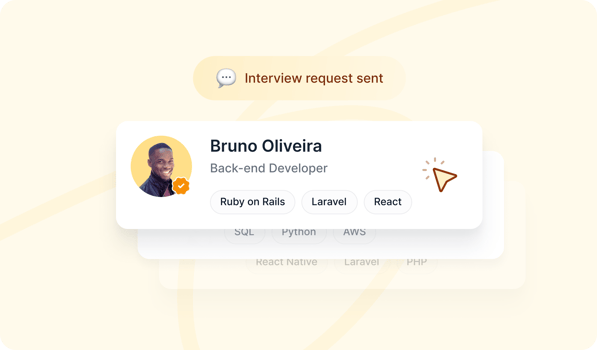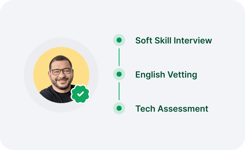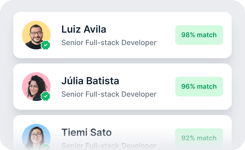Hire Remote Node.js Developers Effectively in 2025
Node.js is a back-end, open-source, cross-platform that allows developers to build scalable network applications using JavaScript. In recent years, Node.js has become increasingly popular due to its high performance and ability to handle large amounts of data.
As a result, many companies are looking to hire skilled Node.js developers to work on their projects. However, finding the right Node.js web developer for your project requirements can be daunting. This article will delve into candidate sourcing and provide interviews and common questions about hiring Node.js developers.
What to Look for When Hiring Node.js Developers
Technical Skills
When hiring a Node.js full-stack developer, technical skills are paramount in hiring top talent.
Proficiency in Node.js
Proficiency in Node.js is crucial for developers who want to build scalable and high-performance web applications. It refers to their ability to effectively use the Node.js platform and its core features, such as modules, event-driven programming, and asynchronous I/O, to build server-side applications, interact with databases and external resources, optimize performance and scalability, and write clean and maintainable code.
Proficient Node.js developers should stay updated with the latest trends, tools, and frameworks. When hiring Node.js developers, assessing their proficiency level through coding tests, technical interviews, and previous work experience is essential.
Knowledge of Javascript
Knowledge of JavaScript is a fundamental requirement for hiring Node.js developers, as Node.js is built on top of the JavaScript language. A solid understanding of the language and its ecosystem is essential for building modern web applications with Node.js.
A Node.js developer with knowledge of JavaScript should be familiar with the syntax and features of the language, including objects, functions, closures, and callbacks. They should also have experience working with the Document Object Model (DOM) and manipulating web page content dynamically using JavaScript. Understanding popular JavaScript libraries and frameworks like jQuery, React, and Angular is important for front-end web app development with Node.js.
When hiring Node.js developers, evaluating their knowledge of JavaScript through coding challenges or technical interviews is essential to ensure they have the necessary skills to build high-quality applications and hire skilled Node.js developers.
Experience with popular Node.js frameworks
Having experience with popular Node.js frameworks is an essential skill for Node.js developers. Frameworks like Express, Koa, or Hapi provide pre-built components and features that help other developers build web applications faster and more efficiently. A Node.js developer with experience in popular frameworks should be able to understand their architecture and how to use them to build scalable and robust web applications.
The developers should be able to write code to create middleware to handle requests, use routing to direct traffic to the correct endpoints, and implement error handling to ensure the application is robust and resilient. Also, hire developers familiar with testing and debugging techniques specific to each framework.
When hiring Node.js developers, assessing their experience with popular Node.js frameworks through coding challenges, portfolio reviews, or technical interviews can help determine their proficiency level and ability to build high-quality applications.
Knowledge of database technologies
Knowledge of database technologies is essential for hiring Node.js developers, as Node.js is often used with databases to build web applications. A Node.js developer with knowledge of database technologies should be familiar with the principles of relational and NoSQL databases and their differences. They should have extensive experience working with popular databases like MongoDB, MySQL, or PostgreSQL and understand how to use them to store and retrieve data from a Node.js application.
The developers should also know how to create and manage database schemas, and other data structures, optimize database performance, and handle migrations. Additionally, they should be able to use Object-Relational Mapping (ORM) libraries like Sequelize or Mongoose to simplify database interactions and reduce boilerplate code.
When hiring Node.js developers, evaluating their knowledge of database technologies through technical interviews, portfolio reviews, or coding challenges can help determine their ability to build scalable and efficient web applications.
Familiarity with testing frameworks
Familiarity with testing frameworks is an essential skill for Node.js developers. Testing is crucial to web application development and process. It helps ensure the application works as expected and new changes or features do not introduce unintended side effects or bugs.
A Node.js developer with familiarity with testing frameworks should be able to write automated tests using frameworks like Mocha, Jasmine, or Jest. They should know how to use assertions to verify the expected outcome of a trial, use test runners to automate the execution of tests, and use mock and stub libraries to isolate components and dependencies during testing.
Additionally, they should be able to write integration and end-to-end tests for web applications to ensure they work correctly across multiple components and environments.
Experience with version control systems
Experience with version control systems is an essential skill for Node.js developers. Version control systems allow software developers to track changes made to source code over time, collaborate with other development team members, and manage different codebase versions.
A Node.js developer with experience in version control systems should be familiar with Git, the most widely used version control system. They should know how to use Git to create branches, merge changes, resolve conflicts, and revert changes. They should also understand basic concepts like commits, tags, and remote repositories.
Additionally, they should be familiar with Git-based workflows like Gitflow or GitHub flow, commonly used in both software development and web development and teams.
Communication Skills
When considering a top Node.js developer for a position, evaluating their communication skills is as important as assessing their technical abilities. Effective communication is critical for developers working on complex projects, as they must collaborate with different stakeholders to ensure project success.
The communication skills to look for include clear and concise communication, active listening, a collaborative working style, professionalism, adaptability, and cultural fit.
Additionally, problem-solving skills are essential, and developers should be able to communicate their approach to problem-solving and work collaboratively to find solutions. Strong communication skills are necessary for a Node.js developer to work effectively as part of a team and contribute to project success.
Knowledge of Security Best Practices
When hiring a Node.js developer, one of the critical areas to focus on is their knowledge of security best practices, particularly regarding common web application vulnerabilities and security frameworks. Look for Node.js developers with experience implementing secure coding procedures to prevent vulnerabilities such as Cross-Site Scripting (XSS), SQL injection, and Cross-Site Request Forgery (CSRF).
It's also essential for Node.js developers to ensure they are familiar with security frameworks and libraries such as Helmet.js and Passport.js. These frameworks and libraries can help implement security measures in the application and provide protection against common web application vulnerabilities. By prioritizing developers with experience and technical expertise in these areas, you can ensure the security of your application and reduce the risk of security breaches or attacks.
Ability to learn new technologies.
Learning new technologies is essential for developers in any field, including Node.js. While experience in specific technologies is valuable, the technology landscape for mobile apps and web development constantly evolves. Developers need to adapt and learn new tools and technologies as they emerge.
When hiring a Node.js developer, look for candidates with a strong aptitude for learning and a willingness to keep up with emerging technologies. One way to assess this is to ask candidates about their experience with learning new technologies in the past. Ask about specific examples of projects or technologies they had to learn quickly and how they acquired the necessary skills and knowledge.
You can look for candidates with a track record of working on open-source projects, contributing to online communities, and attending conferences or meetups related to the programming language Node.js. These activities indicate a passion for technology and a commitment to staying up-to-date with the latest development
Top 5 Node.js Developer Interview Questions
What is the difference between "require" and "import" in Node.js?
This question is crucial for you to ask because it tests a candidate's understanding of how modules work in Node.js. The answer should demonstrate that the candidate knows that "require" is the default way to import modules in Node.js using CommonJS modules, while "import" is used in ES6 modules. Understanding "require" and "import" differences can help developers write more maintainable code and choose the suitable project module format.
In Node.js, "require" and "import" are syntaxes for importing modules from external files or libraries. The primary difference between them is that "require" is a Node.js-specific syntax, while "import" is part of the ECMAScript standard and can be used in modern JavaScript applications.
From the candidate's answer, you can learn whether they are familiar with the basics of the Node.js module system and if they can explain complex concepts clearly and concisely. You can also assess the candidate's ability to adapt to changes in the JavaScript ecosystem and choose the right tools for the job.
How would you handle errors in Node.js?
You might ask this query to gauge the candidate's understanding of best practices in error handling and their ability to write robust and reliable code. A good answer would demonstrate knowledge of handling errors using different techniques in Node.js and an understanding of when to use each method. Additionally, the candidate's answer could reveal their problem-solving skills and how they approach debugging issues in their code.
Handling errors is an essential aspect of building robust and reliable Node.js applications. To handle errors in Node.js, developers can use try-catch blocks, promises, or error middleware. Developers can catch synchronous errors using try-catch blocks, while promises can handle synchronous and asynchronous errors. Error middleware is another option that can take errors in a centralized location.
A solid answer to this question would show that the candidate has experience handling errors in Node.js and understands how to write resilient and reliable code in the face of errors.
What is the difference between callbacks and promises in Node.js?
This question is crucial for you to ask because it demonstrates the candidate's understanding of asynchronous programming in Node.js and their ability to write clean and maintainable code. A candidate who understands the differences between callbacks and promises can write more efficient and effective code and troubleshoot issues related to asynchronous programming. Additionally, candidates familiar with promises may be more up-to-date with modern JavaScript development practices.
Callbacks and promises are both used for asynchronous programming in Node.js, but they differ in their syntax and how they handle errors.
Callbacks are functions that are passed as arguments to other functions and are executed when the original function completes its task. Callbacks can be difficult to manage when multiple levels of nested callbacks lead to "callback hell." Additionally, callbacks do not have any built-in error-handling mechanisms, so errors must be manually checked and handled within the callback function.
On the other hand, promises represent an asynchronous operation's eventual completion (or failure). Promises can be chained together using methods like .then() and .catch(), making handling errors easier and avoiding callback hell. Promises are also easier to read and write than callbacks, providing more functionality like race and all methods.
What is the event loop in Node.js?
This question is vital for you to ask because understanding the event loop is essential for writing efficient and scalable Node.js applications. By asking this question, you can gauge the candidate's knowledge of how Node.js works under the hood and whether they can design and implement performant applications that can handle large numbers of concurrent requests. Additionally, candidates who understand the event loop are more likely to be able to diagnose and fix performance issues in production environments, which is a valuable skill for any Node.js developer to have.
The event loop is a key feature of Node.js, allowing it to handle asynchronous operations efficiently. When Node.js runs, it constantly monitors a queue of events, such as incoming HTTP requests, file I/O operations, and timers. When an event is ready to be processed, the event loop will pick it up and dispatch it to a designated event handler, which may execute some code and/or schedule more events to be processed.
How would you optimize the performance of a Node.js application?
By asking this question, you can understand the candidate's experience and expertise with performance optimization techniques for Node.js. Additionally, you can learn more about their ability to work with complex systems and their problem-solving skills, which are essential for any developer working on performance-critical applications.
Optimizing the performance of a Node.js application is crucial for ensuring that it can handle a large number of concurrent requests and provide fast response times. Asking this question can help you gauge a candidate's knowledge of key performance optimization techniques and their ability to optimize the application to meet specific performance requirements. Here are some potential techniques a candidate might suggest for optimizing Node.js performance:
- Use a load balancer: A load balancer distributes incoming requests across multiple instances of the Node.js application, helping to evenly distribute the workload and preventing any one instance from becoming overwhelmed.
- Optimize database queries: One common bottleneck in Node.js applications is the database. Candidates might suggest using database connection pooling, optimizing database indexes, and caching mechanisms to reduce the number of database requests.
- Minimize network requests: Minimizing the number of external network requests can also help improve performance. Candidates might suggest techniques such as compressing data, reducing the size of responses, and using CDNs to serve static assets.
- Use clustering: Clustering allows a Node.js application to use multiple cores, which can significantly improve performance. Candidates might suggest using the built-in Node.js cluster module or a third-party module like PM2.
- Optimize code execution: Candidates might suggest techniques such as reducing the use of synchronous code, using asynchronous APIs, and using worker threads to improve code execution performance.







